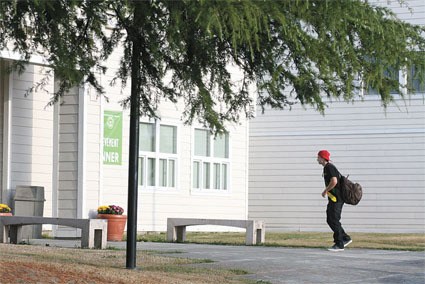For seventh graders, this year marks the end of recess and the beginning of lockers and shuttling from one class to another.
High school comes with its own set of possibilities. Students may drive their car rather than ride the bus. Other milestones await like school dances and college entrance exams.
From adolescence to pre-teen, and then to teen, or from eighth to ninth grade, challenges, obstacles and opportunities lie ahead.
Here are some tips from local experts, to help families navigate gracefully through some of the more tougher transitions.
From Grade School to Middle School
“It’s an enormous transition,” said Nina Page, Friday Harbor Middle School social worker. “They go from being at the top of the totem pole to the bottom of the totem pole.”
Page said kids coming into seventh grade are generally not worried about being stuffed into garbage cans or being picked last for a sports team. What does give kids anxiety is simply having to open and close their lockers.
In just five minutes, students must get from one class to the next, which sometimes involves taking books in and out of their lockers.
Some of us may still remember our first locker experiences in an empty hallway fumbling with a lock that won’t work and feeling like you were the only one in the world who couldn’t get one open.
“It’s the nature of middle school, you feel so alone,” said Page. “So we talk about lockers and worst case scenarios and have parents and volunteers in the hallways the first two weeks of school to help with transitions.”
On the home front, Page reminds parents to set boundaries during the middle school years.
“Emotionally, during this age, there is a push pull for children who are establishing their independence,” said Page. “Don’t let your child push you too far away. Just like two-year-old who pushes you away at night and says, ‘I don’t want a book,’ or ‘I don’t want to go to bed,’ remember it’s important to also say no to your pre-teen.”
This may seem obvious, but its important to not only feed your children balanced and nutritious meals, but also sit down with them for breakfast and dinner.
“Families that eat together have the best communication,” said Cynthia Stark-Wickman, coordinator for the San Juan Island Prevention Coalition. “It gives parents the opportunity to keep a pulse on how things are going.”
Its not just talking during a meal that’s important, but asking open-ended questions that lead to meaningful conversations.
Middle School to High School
Friday Harbor High School Counselor Gordy Waite’s advice to incoming freshman is to get involved in clubs, sports, drama and music, but also get serious about academics.
“Grades matter now that students have permanent transcripts, which can effect their future,” said Waite. “To be successful ask questions and do the work.”
Although teenagers are becoming more independent, Waite urges parents to stay involved through all four years of high school.
“Kids need to start making their own decisions,” said Waite. “But parents need to be there to support them and think about the next four years when making decisions.”
For instance, parents should set a reasonable curfew time during your child’s freshman year and increase that time throughout the years.
“If a freshman has a curfew of 2 a.m. what will their curfew be as a senior?” Waite said. “You have to look at the whole picture. The next four years will go fast. Help kids make positive choices.”
Incoming Seniors
Waite warns kids from getting “senioritis” too early in the year and gives the same advice to seniors as freshman.
“Get involved, stay involved or if you haven’t been involved in extracurricular activities, this is your last
chance,” said Waite. “The more kids are involved in school, the better the school is.”
For seniors, thinking about college can be over-whelming and some students have a tendency to procrastinate.
Waite tries to meet with every senior early in the year to help them begin the process of writing essays and filling out forms for college applications.
Stark-Wickham likes to remind parents that this is the last year they may be able to have nightly meals with their child. This is also the last opportunity to discuss issues like drugs and alcohol.
“Don’t ease up when it comes to talking with your kids,” Stark-Wickham said. “And the beginning of the year is the perfect time to set the standard for how the year will go.”




